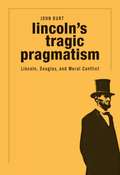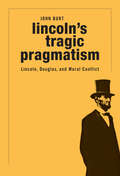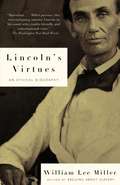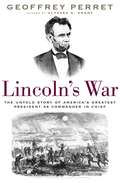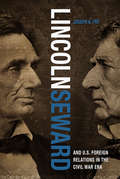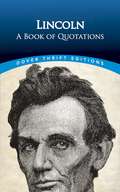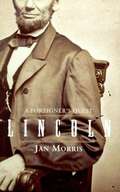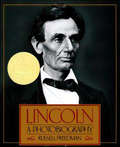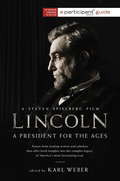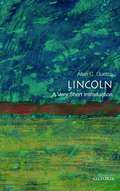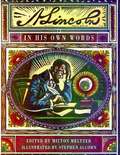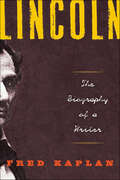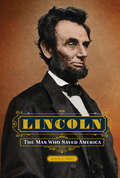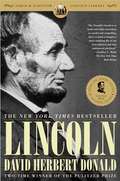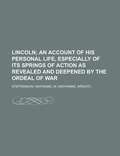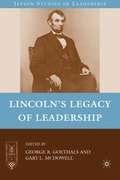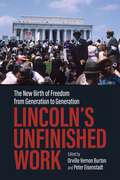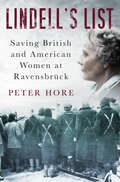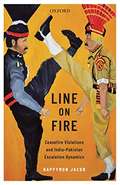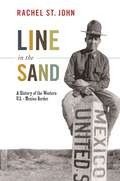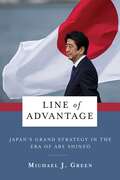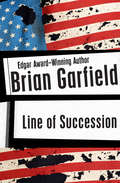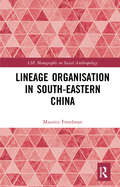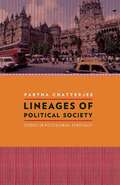- Table View
- List View
Lincoln's Tragic Pragmatism
by John BurtIn 1858, challenger Abraham Lincoln debated incumbent Stephen Douglas seven times in the race for a U. S. Senate seat from Illinois. More was at stake than slavery in those debates. In Lincoln’s Tragic Pragmatism, John Burt contends that the very legitimacy of democratic governance was on the line. In a United States stubbornly divided over ethical issues, the overarching question posed by the Lincoln-Douglas debates has not lost its urgency: Can a liberal political system be used to mediate moral disputes? And if it cannot, is violence inevitable? As they campaigned against each other, both Lincoln and Douglas struggled with how to behave when an ethical conflict as profound as the one over slavery strained the commitment upon which democracy depends-namely, to rule by both consent and principle. This commitment is not easily met, because what conscience demands and what it is able to persuade others to consent to are not always the same. While Lincoln ultimately avoided a politics of morality detached from consent, and Douglas avoided a politics of expediency devoid of morality, neither found a way for liberalism to mediate the conflict of slavery. That some disputes seemed to lie beyond the horizon of deal-making and persuasion and could be settled only by violence revealed democracy’s limitations. Burt argues that the unresolvable ironies at the center of liberal politics led Lincoln to discover liberalism’s tragic dimension-and ultimately led to war. Burt’s conclusions demand reevaluations of Lincoln and Douglas, the Civil War, and democracy itself.
Lincoln's Tragic Pragmatism: Lincoln, Douglas, and Moral Conflict
by John BurtA New York Times Book Review Editors’ ChoiceIn 1858, challenger Abraham Lincoln debated incumbent Stephen Douglas seven times in the race for a U.S. Senate seat from Illinois. More was at stake than slavery in those debates. In Lincoln’s Tragic Pragmatism, John Burt contends that the very legitimacy of democratic governance was on the line. In a United States stubbornly divided over ethical issues, the overarching question posed by the Lincoln-Douglas debates has not lost its urgency: Can a liberal political system be used to mediate moral disputes? And if it cannot, is violence inevitable?“John Burt has written a work that every serious student of Lincoln will have to read...Burt refracts Lincoln through the philosophy of Kant, Rawls and contemporary liberal political theory. His is very much a Lincoln for our time.”—Steven B. Smith, New York Times Book Review“I'm making space on my overstuffed shelves for Lincoln’s Tragic Pragmatism. This is a book I expect to be picking up and thumbing through for years to come.”—Jim Cullen, History News Network“Burt treats the [Lincoln-Douglas] debates as being far more significant than an election contest between two candidates. The debates represent profound statements of political philosophy and speak to the continuing challenges the U.S. faces in resolving divisive moral conflicts.”—E. C. Sands, Choice
Lincoln's Virtues: An Ethical Biography
by William Lee MillerWilliam Lee Miller's ethical biography is a fresh, engaging telling of the story of Lincoln's rise to power. Through careful scrutiny of Lincoln's actions, speeches, and writings, and of accounts from those who knew him, Miller gives us insight into the moral development of a great politician -- one who made the choice to go into politics, and ultimately realized that vocation's fullest moral possibilities. As Lincoln's Virtues makes refreshingly clear, Lincoln was not born with his face on Mount Rushmore; he was an actual human being making choices -- moral choices -- in a real world. In an account animated by wit and humor, Miller follows this unschooled frontier politician's rise, showing that the higher he went and the greater his power, the worthier his conduct would become. He would become that rare bird, a great man who was also a good man. Uniquely revealing of its subject's heart and mind, it represents a major contribution to our understanding and of Lincoln, and to the perennial American discussion of the relationship between politics and morality.
Lincoln's War: The Untold Story of America's Greatest President as Commander-In-Chief
by Geoffrey PerretThis is a readable and yet scholarly work which serves as both history and biography. "Incredible as it may seem to us, when Lincoln became president, there was still a question as to whether the president, even acting as commander in chief, had the power to determine military policy. It fell to Lincoln to create the role of commander in chief. This book tells how he did that and how, in so doing, he created the modern presidency."
Lincoln, Seward, and U.S. Foreign Relations in the Civil War Era (Studies in Conflict, Diplomacy, and Peace)
by Joseph A. Fry&“A heartening reminder that politicians, at their best, can rise above petty rivalries and jealousies to serve a larger cause.&” —Don H. Doyle, author of The Cause of All Nations: An International History of the American Civil War The Civil War marked a significant turning point in American history—not only for the United States itself but for its relations with foreign powers both during and after the conflict. The friendship and foreign policy partnership between President Abraham Lincoln and Secretary of State William Henry Seward shaped those US foreign policies. These unlikely allies, who began as rivals during the 1860 presidential nomination, helped ensure that America remained united and prospered in the aftermath of the nation&’s consuming war. In Lincoln, Seward, and US Foreign Relations in the Civil War Era, Joseph A. Fry examines the foreign policy decisions that resulted from this partnership and the legacy of those decisions. Lincoln and Seward, despite differences in upbringing, personality, and social status, both adamantly believed in the preservation of the union and the need to stymie slavery. They made that conviction the cornerstone of their policies abroad, and through those policies, such as Seward threatening war with any nation that intervened in the Civil War, they prevented European intervention that could have led to Northern defeat. The Union victory allowed America to resume imperial expansion, a dynamic that Seward sustained beyond Lincoln&’s death during his tenure as President Andrew Johnson&’s Secretary of State. Fry&’s analysis of the Civil War from an international perspective and the legacy of US policy decisions provides a more complete view of the war and a deeper understanding of this crucial juncture in American history.
Lincoln: A Book Of Quotations (Dover Thrift Editions)
by Bob Blaisdell"All I have learned, I learned from books," declared Abraham Lincoln -- and this book offers ample learning from the sixteenth president's wise and often witty remarks. Drawn from speeches, letters, and other sources, these thoughts and opinions range from considerations of human nature and spirituality to the burdens and privileges of the presidency along with many other topics of enduring interest.Selections include comments on morality ("It has been my experience that folks who have no vices have very few virtues.") and the pursuit of happiness ("Folks are usually about as happy as they make their minds up to be.") as well as friendship ("I'm a success today because I had a friend who believed in me and I didn't have the heart to let him down."), human frailty ("It's not me who can't keep a secret. It's the people I tell that can't."), and other thought-provoking subjects.
Lincoln: A Foreigner's Quest
by Jan MorrisWith a fresh eye and inimitable style, the peerless travel and history writer Jan Morris journeys through the life of Abraham Lincoln to sketch an insightful new portrait of America's sixteenth president, one of our greatest and most enigmatic figures. Looking past his saintly image and log-cabin legend, Morris travels from Lincoln's birthplace to the White House to the infamous Ford Theater and conjures him in public and in private, as politician and as father, as commander-in-chief and as husband. With her skepticism and humor and marvelous sense of place, Morris seamlessly blends narrative, history, and biography to reveal the man behind the myth.
Lincoln: A Photobiography (Journeys 2014)
by Russell FreedmanThe Newbery Medal–winning book for young readers presents &“a human portrait of a politician honorably confronting the most vexing issues of his era&” (The New York Times Book Review). Abraham Lincoln stood out in a crowd as much for his wit and rollicking humor as for his height. This Newbery Medal-winning biography of our Civil War president is warm, appealing, and illustrated with dozens of carefully chosen photographs and prints. Russell Freedman begins with a lively account of Abraham Lincoln's boyhood, his career as a country lawyer, and his courtship and marriage to Mary Todd. Then the author focuses on Lincoln&’s presidency, skillfully explaining the many complex issues he grappled with as he led a deeply divided nation through the Civil War. The book's final chapter is a moving account of his tragic death at Ford's Theatre on April 14, 1865. The volume concludes with a sampling of Lincoln writings and a detailed list of Lincoln historical sites. "Few, if any, of the many books written for children about Lincoln can compare with Freedman's contribution…This is an outstanding example of what (juvenile) biography can be. Like Lincoln himself, it stands head and shoulders above its competition." —School Library Journal
Lincoln: A President for the Ages
by Karl Weber Participant MediaThe First American. Frontiersman and backwoods attorney. Teller of bawdy tales and a spellbinding orator. A champion of liberty some called a would-be tyrant. Savior of the Union and the Great Emancipator. All these are Abraham Lincoln-in his time America's most admired and reviled leader, and still our nation's most enigmatic and captivating hero. Timed to complement the new motion picture Lincoln, directed by Steven Spielberg, Lincoln: A President for the Ages introduces a new Lincoln grappling with some of history's greatest challenges. Would Lincoln have dropped the bomb on Hiroshima? How would he conduct the War on Terror? Would he favor women's suffrage or gay rights? Would today's Lincoln be a star on Facebook and Twitter? Would he embrace the religious right-or denounce it? The answers come from an all-star array of historians and scholars, including Jean Baker, Richard Carwardine, Dan Farber, Andrew Ferguson, Henry Louis Gates Jr. , Allen C. Guelzo, Harold Holzer, James Malanowski, James Tackach, Frank J. Williams, and Douglas L. Wilson. Lincoln also features actor/activist Gloria Reuben describing how she played Elizabeth Keckley, the former-slave-turned-confidante of First Lady Mary Todd Lincoln; and a selection of speeches and letters that explore little-known sides of Lincoln; "The Faces of Lincoln," exploring his complex contemporary legacy. Whether you're a lifetime admirer of Lincoln or newly intrigued by his story, Lincoln: A President for the Ages offers a fascinating glimpse of his many-sided legacy.
Lincoln: A Very Short Introduction
by Allen C. GuelzoBeneath the surface of the apparently untutored and deceptively frank Abraham Lincoln ran private tunnels of self-taught study, a restless philosophical curiosity, and a profound grasp of the fundamentals of democracy. Now, in Lincoln: A Very Short Introduction, the award-winning Lincoln authority Allen C. Guelzo offers a penetrating look into the mind of one of our greatest presidents. If Lincoln was famous for reading aloud from joke books, Guelzo shows that he also plunged deeply into the mainstream of nineteenth-century liberal democratic thought. Guelzo takes us on a wide-ranging exploration of seven problems that confronted Lincoln and liberal democracy--equality, opportunity, the rule of law, slavery, freedom, and reconciliation. The book sets these problems and Lincoln's responses against the larger world of American and trans-Atlantic liberal democracy in the 19th century, comparing Lincoln not just to Andrew Jackson or John Calhoun, but to British thinkers such as Richard Cobden, Jeremy Bentham, and John Bright, and to French observers Alexis de Tocqueville and Francois Guizot. The Lincoln we meet here is an Enlightenment figure who struggled to create a common ground between a people focused on individual rights and a society eager to establish a certain moral, philosophical, and intellectual bedrock. Lincoln insisted that liberal democracy had a higher purpose, which was the realization of a morally right political order. But how to interject that sense of moral order into a system that values personal self-satisfaction--"the pursuit of happiness"--remains a fundamental dilemma even today. Abraham Lincoln was a man who, according to his friend and biographer William Henry Herndon, "lived in the mind." Guelzo paints a marvelous portrait of this Lincoln--Lincoln the man of ideas--providing new insights into one of the giants of American history.
Lincoln: In His Own Words
by Milton MelzerCombines background commentary with quotes from Lincoln's letters, speeches, and public papers to provide a personal view of his life, thoughts, and actions.
Lincoln: The Biography of a Writer
by Fred Kaplan“A fine, invaluable book. . . . Certain to become essential to our understanding of the 16th president. . . . Kaplan meticulously analyzes how Lincoln’s steadily maturing prose style enabled him to come to grips with slavery and, as his own views evolved, to express his deepening opposition to it.” — Jonathan Yardley, The Washington Post Book WorldFor Abraham Lincoln, whether he was composing love letters, speeches, or legal arguments, words mattered. In Lincoln, acclaimed biographer Fred Kaplan explores the life of America's sixteenth president through his use of language both as a vehicle to express complex ideas and feelings and as an instrument of persuasion and empowerment.This unique and engrossing account of Lincoln's life and career highlights the shortcomings of the modern presidency, reminding us, through Lincoln's legacy and appreciation for language, that the careful and honest use of words is a necessity for successful democracy.
Lincoln: The Man Who Saved America (Illustrated Lives)
by David J KentA lively, illustrated biography of America’s 16th president from his humble beginnings to his historic leadership during the Civil War.Abraham Lincoln was, to put it mildly, an unlikely candidate for president. Raised on the frontier and mostly self-taught, the gangly farmer had little in common with the Founding Fathers, with one exception: a deep and abiding belief in America’s still-fragile experiment in democracy. Turning his quick mind and gregarious personality to politics, Lincoln ascended through state and national government, before being elected president in 1860 on the eve of the Civil War. During that bloody and devastating conflict, Lincoln’s tenacity, strategic brilliance, and plain-spoken eloquence not only helped keep the nation together through its darkest hours but also set the course for a reconciliation that he would not live to see. Filled with historical drama and packed with rare illustrations, Lincoln: The Man Who Saved America weaves the fascinating biography of Abraham Lincoln into the story of the most perilous period in American history.
Lincoln: Two Glimpses Of Abraham Lincoln's Family Life
by David Herbert DonaldDavid Herbert Donald's Lincoln is a stunningly original portrait of Lincoln's life and presidency. Donald brilliantly depicts Lincoln's gradual ascent from humble beginnings in rural Kentucky to the ever- expanding political circles in Illinois, and finally to the presidency of a country divided by civil war. Donald goes beyond biography, illuminating the gradual development of Lincoln's character, chronicling his tremendous capacity for evolution and growth, thus illustrating what made it possible for a man so inexperienced and so unprepared for the presidency to become a great moral leader. In the most troubled of times, here was a man who led the country out of slavery and preserved a shattered Union -- in short, one of the greatest presidents this country has ever seen.
Lincolnomics: How President Lincoln Constructed the Great American Economy
by John F. WasikA biography of Abraham Lincoln that examines his untold legacy as the Great Builder of American infrastructure. Abraham Lincoln&’s view of the right to fulfill one&’s economic destiny was at the core of his governing philosophy―but he knew no one could climb that ladder without strong federal support. Some of his most enduring policies came to him before the Civil War, visions of a country linked by railroads running ocean to ocean, canals turning small towns into bustling cities, public works bridging farmers to market. Expertly appraising the foundational ideas and policies on infrastructure that America&’s sixteenth president rooted in society, John F. Wasik tracks Lincoln from his time in the 1830s as a young Illinois state legislator pushing internal improvements; through his work as a lawyer representing the Illinois Central Railroad in the 1840s; to his presidential fight for the Transcontinental Railroad; and his support of land-grant colleges that educated a nation. To Lincoln, infrastructure meant more than the roads, bridges, and canals he shepherded as a lawyer and a public servant. These brick-and-mortar developments were essential to a nation&’s lifting citizens above poverty and its isolating origins. Lincolnomics revives the disremembered history of how Lincoln paved the way for Eisenhower&’s interstate highways and FDR&’s social amenities. With an afterword addressing the failure of American infrastructure during the COVID-19 pandemic, and how Lincoln&’s policies provide a guide to the future, Lincolnomics makes the case for the man nicknamed &“The Rail Splitter&” as the Presidency&’s greatest builder. &“In this unique blend of biography and policy prescription, journalist Wasik . . . casts Abraham Lincoln as America&’s &“foremost moral architect of economic and social opportunity&” and looks to his life and political career for lessons in how the nation might rebuild its infrastructure and redress income inequality. . . . Wasik convincingly argues that [Lincoln&’s] economic policies deserve more credit.&” —Publishers Weekly &“While revealing as history, Wasik&’s account about the first Republican President&’s launches of infrastructure shame the ignorant, obstinate, narcissist Republicans of today who wish instead to build up tyrant Trump&’s political infrastructure. This is a book to be read and used today.&” —Ralph Nader &“Wasik invented a new word for this book because his theme bears new force: Abraham Lincoln sought a better-built nation and a freer legal space to help every individual, regardless of background, to aspire and rise. Most historians know this too vaguely about Lincoln; Wasik finally gives the great democratic idea the prominence it deserves.&” —James M. Cornelius, Ph.D., editor, Journal of the Abraham Lincoln Association
Lincoln’s Legacy of Leadership
by Gary L. Mcdowell George R. GoethalsAn in-depth look at Abraham Lincoln's leadership, both before and during his presidency. Lincoln led through times of confusion, war, and dissent. The set of chapters included in this volume are based on papers that constituted part of the 2008-2009 Jepson Leadership Forum at the Jepson School of Leadership Studies at the University of Richmond.
Lincoln’s Unfinished Work: The New Birth of Freedom from Generation to Generation
by Eric Foner Richard Carwardine Mark Schultz Jerald Podair Gavin Wright Stephen Kantrowitz William Haller J. William Harris Randall Stephens Joshua Casmir Catalano Greg Downs James Loewen Lawrence McDonnell Adrienne Petty Briana Pocratsky Rhondda ThomasIn his Gettysburg Address, Abraham Lincoln promised that the nation’s sacrifices during the Civil War would lead to a “new birth of freedom.” Lincoln’s Unfinished Work analyzes how the United States has attempted to realize—or subvert—that promise over the past century and a half. The volume is not solely about Lincoln, or the immediate unfinished work of Reconstruction, or the broader unfinished work of America coming to terms with its tangled history of race; it investigates all three topics.The book opens with an essay by Richard Carwardine, who explores Lincoln’s distinctive sense of humor. Later in the volume, Stephen Kantrowitz examines the limitations of Lincoln’s Native American policy, while James W. Loewen discusses how textbooks regularly downplay the sixteenth president’s antislavery convictions. Lawrence T. McDonnell looks at the role of poor Blacks and whites in the disintegration of the Confederacy. Eric Foner provides an overview of the Constitution-shattering impact of the Civil War amendments. Essays by J. William Harris and Jerald Podair examine the fate of Lincoln’s ideas about land distribution to freedpeople. Gregory P. Downs focuses on the structural limitations that Republicans faced in their efforts to control racist violence during Reconstruction. Adrienne Petty and Mark Schultz argue that Black land ownership in the post-Reconstruction South persisted at surprisingly high rates. Rhondda Robinson Thomas examines the role of convict labor in the construction of Clemson University, the site of the conference from which this book evolved. Other essays look at events in the twentieth and twenty-first centuries. Randall J. Stephens analyzes the political conservatism of white evangelical Christianity. Peter Eisenstadt uses the career of Jackie Robinson to explore the meanings of integration. Joshua Casmir Catalano and Briana Pocratsky examine the debased state of public history on the airwaves, particularly as purveyed by the History Channel. Gavin Wright rounds out the volume with a striking political and economic analysis of the collapse of the Democratic Party in the South.Taken together, the essays in this volume offer a far-reaching, thought-provoking exploration of the unfinished work of democracy, particularly as it pertains to the legacy of slavery and white supremacy in America.
Lindell's List: Saving British and American Women at Ravensbrück
by Peter HoreAlready a decorated heroine of the First World War, British-born Mary Lindell, Comtesse de Milleville, was one of the most colourful and courageous agents of the Second World War, yet her story has almost been forgotten. Evoking the spirit of Edith Cavell, and taking the German occupation of Paris in 1940 as a personal affront, she led an escape line for patriotic Frenchmen and British soldiers. After imprisonment, escape to England, a secret return to France and another arrest, she began to witness the horrors of German-run prisons and concentration camps. In April 1945, a score of British and American women emerged from the Women’s Hell – Ravensbrück concentration camp – who had been kept alive by the willpower and the strength of one woman, Mary Lindell. She combined a passion for adventure with blunt speech and persistently displayed the greatest personal bravery in the face of great adversity. To counter German claims that they had no British or American prisoners, Mary smuggled out a plea for rescue and produced her list from her pinafore pocket, compiled in secret from the camp records. This vital list contained the names of captured women, many of whom were agents of British Military Intelligence, the Special Operations Executive or the French Resistance. Poignantly supported by first-hand testimony, Lindell’s List tells the moving story of Mary Lindell’s heroic leadership and the endurance of a group of women who defied the Nazis in the Second World War.
Line On Fire: Ceasefire Violations And India-pakistan Escalation Dynamics (Oxford International Relations In South Asia)
by Sumit Ganguly E. Sridharan Happymon JacobThe India–Pakistan border in Jammu & Kashmir has witnessed repeated ceasefire violations (CFVs) over the past decade. As relations between India and Pakistan have deteriorated, CFVs have increased exponentially. It is imperative to gain a deeper understanding of these violations owing to their potential to not only cause a crisis but also escalate an ongoing one. Line on Fire, part of the Oxford International Relations in South Asia series, postulates that the incorrect diagnosis of the reasons behind CFVs has led to wrong policies being adopted by both India and Pakistan to deal with the recurrent violations. Using fresh empirical data and first-hand accounts, the volume attempts to understand the reason why CFVs continue to take place between India and Pakistan despite consistent efforts to reduce the tension between the two nations. In doing so, it recontextualizes and enriches the prevailing arguments in contemporary literature on escalating dynamics and unenduring ceasefire agreements between the two South Asian nuclear rivals.
Line in the Sand: A History of the Western U.S.-Mexico Border (America in the World #11)
by Rachel St. JohnThe first transnational history of the U.S.-Mexico borderLine in the Sand details the dramatic transformation of the western U.S.-Mexico border from its creation at the end of the Mexican-American War in 1848 to the emergence of the modern boundary line in the first decades of the twentieth century. In this sweeping narrative, Rachel St. John explores how this boundary changed from a mere line on a map to a clearly marked and heavily regulated divide between the United States and Mexico. Focusing on the desert border to the west of the Rio Grande, this book explains the origins of the modern border and places the line at the center of a transnational history of expanding capitalism and state power in the late nineteenth and early twentieth centuries.Moving across local, regional, and national scales, St. John shows how government officials, Native American raiders, ranchers, railroad builders, miners, investors, immigrants, and smugglers contributed to the rise of state power on the border and developed strategies to navigate the increasingly regulated landscape. Over the border's history, the U.S. and Mexican states gradually developed an expanding array of official laws, ad hoc arrangements, government agents, and physical barriers that did not close the line, but made it a flexible barrier that restricted the movement of some people, goods, and animals without impeding others. By the 1930s, their efforts had created the foundations of the modern border control apparatus.Drawing on extensive research in U.S. and Mexican archives, Line in the Sand weaves together a transnational history of how an undistinguished strip of land became the significant and symbolic space of state power and national definition that we know today.
Line of Advantage: Japan’s Grand Strategy in the Era of Abe Shinzō (Contemporary Asia in the World)
by Michael GreenNo other country has devised a grand strategy for managing China’s rising economic and military power as deliberately or successfully as Japan. Seeking to counter Chinese ambitions toward regional hegemony, Japan has taken an increasingly assertive role in East Asia and the world. During the tenure of Prime Minister Abe Shinzo, the country pursued closer security cooperation with the United States and other democracies, established a more centralized national defense system, and advanced rules and norms to preserve the open regional order in the Indo-Pacific that is crucial to its prosperity and survival—all while managing an important economic relationship with China.In Line of Advantage, Michael J. Green provides a groundbreaking and comprehensive account of Japan’s strategic thinking under Abe. He explains the foundational logic and the worldview behind this approach, from key precedents in Japanese history to the specific economic, defense, and diplomatic priorities shaping contemporary policy toward China, the United States, the two Koreas, and the Indo-Pacific region. Drawing on two decades of access to Abe and other Japanese political, military, and business leaders, Green provides an insider’s perspective on subjects such as how Japan pursued competition with China without losing the benefits of economic cooperation. Assessing the strengths and weaknesses of Japan’s new active role, Line of Advantage sheds new light on a period with profound implications for the future of U.S. competition with China and international affairs in Asia more broadly.
Line of Succession
by Brian GarfieldFive bombs upend the foundation of the American governmentSturka is an artist with explosives. A sturdy man approaching middle age, he learned his trade on the darkest battlefields of the twentieth century: Indochina, Palestine, Guyana, Biafra, and the fetid jungles of South America, where he fought alongside Che Guevera but was quick enough not to die with him. He doesn&’t know where his new employers hail from; he only knows how well they pay. Today he packs plastic explosive into the false bottoms of three handbags and two suitcases, to be left at strategic locations around Washington, D.C. But this is no ordinary café bombing. Today Sturka targets the men at the top of the American government. The attack causes a crisis of succession, the likes of which America has never seen. If the right man doesn&’t take charge quickly, the country will tear itself apart.
Lineage Organisation in South-Eastern China (LSE Monographs on Social Anthropology)
by Maurice FreedmanThis essay is the work of a social anthropologist but it is not based upon field work. It is concerned with Chinese matters but it is not written by a sinologue. In this essay are the author’s reflections on certain aspects of southeastern Chinese society during the last hundred and fifty years, with attention on the Fukien and Kwangtung region of China has it has specialized not only in large-scale unilineal organization but also in sending people overseas.
Lineages of Political Society: Studies in Postcolonial Democracy (Cultures of History)
by Partha ChatterjeePartha Chatterjee, a pioneering theorist known for his disciplinary range, builds on his theory of "political society" and reinforces its salience to contemporary political debate. Dexterously incorporating the concerns of South Asian studies, postcolonialism, the social sciences, and the humanities, Chatterjee broadly critiques the past three hundred years of western political theory to ask, Can democracy be brought into being, or even fought for, in the image of Western democracy as it exists today? Using the example of postcolonial societies and their political evolution, particularly communities within India, Chatterjee undermines the certainty of liberal democratic theory in favor of a realist view of its achievements and limitations. Rather than push an alternative theory, Chatterjee works solely within the realm of critique, proving political difference is not always evidence of philosophical and cultural backwardness outside of the West. Resisting all prejudices and preformed judgments, he deploys his trademark, genre-bending, provocative analysis to upend the assumptions of postcolonial studies, comparative history, and the common claims of contemporary politics.
